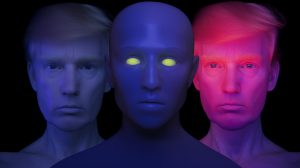Negli ultimi anni, la Cina ha intensificato la sua lotta contro i deepfake, ovvero le immagini e i video generati artificialmente che possono essere usati per diffondere notizie false e manipolare l’opinione pubblica. Tuttavia, nonostante le misure rigorose adottate dal governo cinese, le app cinesi specializzate nella creazione di deepfake stanno guadagnando popolarità in tutto il mondo. In questo articolo, analizzeremo le politiche adottate dalla Cina per contrastare i deepfake e come queste app continuano a diffondersi in altri mercati.

La repressione cinese sui deepfake
La Cina ha preso una serie di misure per combattere i deepfake e proteggere i suoi cittadini da disinformazione e manipolazione. Tra queste misure, figurano:
- Leggi e regolamenti: nel 2019, la Cina ha emanato nuove leggi che vietano la creazione e la diffusione di video e immagini manipolati con l’intelligenza artificiale senza il consenso delle persone coinvolte. Le violazioni possono portare a multe e persino all’arresto.
- Controllo delle app: il governo cinese esercita un rigoroso controllo sulle app di deepfake, imponendo restrizioni sull’accesso e sulla distribuzione di queste applicazioni nel paese.
- Collaborazione con le aziende tecnologiche: le autorità cinesi stanno lavorando a stretto contatto con le principali aziende tecnologiche per identificare e rimuovere i deepfake e per sviluppare soluzioni per prevenire la loro diffusione.

La diffusione delle app cinesi di deepfake in altri mercati
Nonostante la repressione del governo cinese, le app di deepfake cinesi continuano a guadagnare terreno in altri paesi. Queste app sfruttano le opportunità offerte dai mercati internazionali, dove la regolamentazione dei deepfake è meno severa o addirittura inesistente. Alcune delle ragioni principali alla base di questa espansione includono:
- La crescente domanda di tecnologie di intelligenza artificiale: l’interesse per le applicazioni basate sull’intelligenza artificiale, inclusi i deepfake, è in aumento in tutto il mondo. Gli utenti sono attratti dalle funzionalità avanzate offerte da queste app, come la creazione di video personalizzati o la modifica del proprio aspetto in tempo reale.
- L’assenza di regolamentazione uniforme: la mancanza di un quadro normativo globale sui deepfake rende difficile per i governi e le organizzazioni internazionali contrastare efficacemente la diffusione di queste app.
- Il potenziale di monetizzazione: le app di deepfake offrono alle aziende cinesi la possibilità di monetizzare i loro prodotti attraverso la pubblicità e gli acquisti in-app, permettendo loro di espandersi in nuovi mercati e generare profitti.

La repressione della Cina sui deepfake non è riuscita a impedire la diffusione delle sue app in altri mercati. Il crescente interesse per le tecnologie di intelligenza artificiale, l’assenza di una regolamentazione uniforme e le opportunità di monetizzazione hanno contribuito alla popolarità di queste applicazioni al di fuori della Cina. Per affrontare efficacemente il problema dei deepfake, è fondamentale che i governi e le organizzazioni internazionali lavorino insieme per stabilire normative e politiche globali che possano limitare la creazione e la diffusione di contenuti manipolati e proteggere la società dalla disinformazione e dalla manipolazione.








